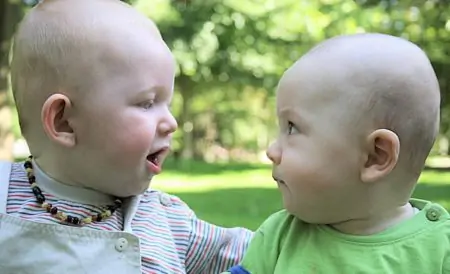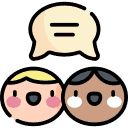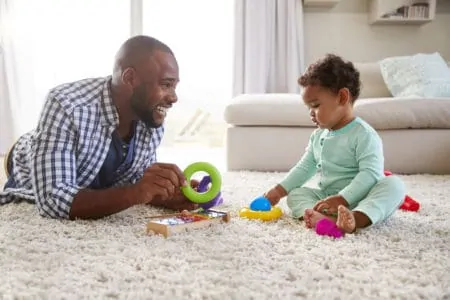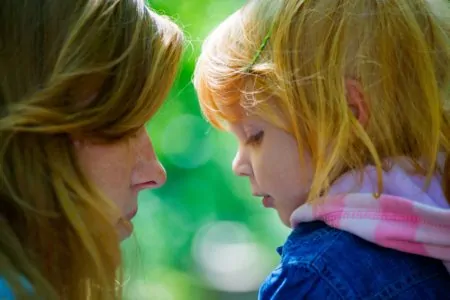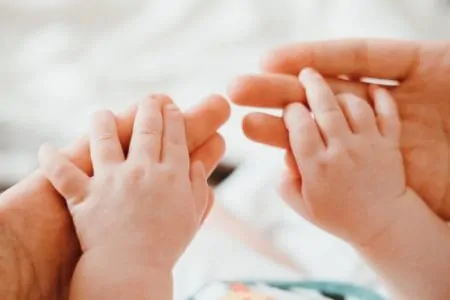Is your baby engaging in a heated debate with the family dog in gibberish? Or maybe they are staring at you silently while you narrate your lunch prep. With such a wide range of “normal,” it is tough to know when to celebrate a milestone and when to call the doctor.
We have combined years of personal parenting experience with expert research to help you gauge where your child stands. Whether you are eagerly awaiting that first “mama” or worried about a quiet toddler, this guide covers average speech development, how to boost it, and when to seek help.
Key Takeaways
- Most babies say their first specific, meaningful word between 10 and 14 months.
- Receptive language (understanding) develops before expressive language (speaking).
- You can boost speech by narrating your day, reading often, and leaving pauses for your baby to respond.
- Red flags include a lack of gestures by 12 months or zero words by 16 to 18 months.
When Do Babies Start Talking?
Most babies say their first true word sometime around their first birthday. However, the buildup happens long before that. Before they speak a clear word, your baby will babble, coo, and experiment with sounds like “ba-ba” and “da-da” (1).
While the “average” is around the 12-month mark, the normal range for a first word is anywhere from 9 to 14 months. Every child follows a slightly different timeline.
Speech vs. Language: What Is the Difference?
To understand your baby’s progress, it helps to know the difference between speech and language.
- Speech: This is the physical act of forming sounds. It involves the coordination of the jaw, tongue, and lips to create recognizable noises.
- Language: This is the entire system of communication. It includes receptive language (what your baby understands) and expressive language (gestures, words, and writing).
If your child is not talking yet but points to a cup when they are thirsty or looks at the door when you say “Daddy is home,” their receptive language skills are on track. This is a great sign.
Verbal Development Milestones
Language development is a marathon, not a sprint. Here are the specific milestones to watch for as your baby grows.
Birth to 3 Months
- Uses different cries to express hunger, pain, or tiredness.
- Makes cooing noises (vowel sounds like “oh” or “ah”).
- Smiles at you when you speak.
- Startles at loud noises.
4 to 6 Months
- Laughs and giggles.
- Begins “vocal play” (squealing, growling, blowing raspberries).
- Babbles with consonants, like “pa,” “ba,” or “mi.”
- Responds to the tone of your voice (cries if you sound angry).
7 Months to 1 Year
- Uses gestures like waving bye-bye or shaking their head “no.”
- Understands common words like “cup,” “shoe,” or “juice.”
- Uses longer strings of babble (e.g., “ba-da-ma-ba”).
- Says one or two words around the first birthday (often “mama” or “dada”), though they may not be perfectly clear.
12 to 18 Months
- Has a vocabulary of 5 to 20 words.
- Tries to repeat words you say.
- Follows simple one-step directions (“Pick up the ball”).
- Points to body parts when asked.
18 to 24 Months
- Experiences a “language explosion,” learning new words rapidly.
- Starts putting two words together (“More milk,” “Mommy go”).
- Vocabulary expands to 50 words or more.
- People outside the family can understand about 50% of what they say.
How to Encourage Babies to Talk
You do not need fancy flashcards to teach your baby to speak. You are their best teacher. Here are easy ways to encourage your child to talk during daily routines.
1. Be a Sportscaster
Narrate your day. Describe what you are doing, seeing, and touching. For example: “I am washing the blue cup. Now I am drying it.” This floods your baby’s brain with vocabulary in context.
2. The “Wait” Rule
When you ask your baby a question, wait 10 seconds before speaking again. Babies process information slower than adults. That silence gives them the space to formulate a sound or gesture back to you.
3. Read Often
Sharing books is one of the best ways to build language. Reading the same books repeatedly helps reinforce the sounds, tones, and rhythm of language. Point to pictures and name them, rather than just reading the text.
4. Ditch the Pacifier
While pacifiers are great for soothing, they can physically block speech practice. Try to limit pacifier use to sleep times only once your baby starts babbling more frequently.
Causes of Speech Delays
If your child is falling behind, it is rarely due to something you did or did not do. Common causes include:
1. Hearing issues
Chronic ear infections can cause temporary hearing loss. If a child cannot hear words clearly, they cannot learn to say them. Even mild hearing loss can delay speech significantly (2).
2. Oral-Motor Problems
Some children have difficulty coordinating the lips, tongue, and jaw to produce speech sounds. This is often related to the brain’s ability to communicate with the facial muscles (apraxia).
3. Lack of Stimulation
While rare, if a child is not spoken to enough or lacks social interaction, they may not develop the necessary neural pathways for speech (3).
4. Developmental Disorders
Speech delay can be a symptom of broader developmental issues, such as Autism Spectrum Disorder (ASD), cerebral palsy, or intellectual disabilities (4).
When Should You Worry?
There is a wide range of normal, but trust your gut. If you are concerned, consult your pediatrician or a speech-language pathologist (SLP). Watch for these red flags (5):
- By 12 months: No babbling, pointing, or gesturing (waving).
- By 16 months: No single words.
- By 24 months: No two-word phrases (like “want juice”).
- Any age: Any loss of speech or social skills they previously had (regression).
The CDC offers a free milestone tracker app to help you monitor progress (6).
FAQs About Babies Talking
Here are the most common questions parents ask about speech development:
The Bottom Line
Most babies start talking around their first birthday, but the lead-up involves months of cooing, babbling, and gesturing. Remember that understanding language (receptive skills) is just as important as speaking it.
If your child is a little quiet but uses gestures and understands you, they are likely just taking their time. However, if you notice no gestures by 12 months or no words by 16 months, reach out to your pediatrician or local early intervention program. Early help makes a massive difference.
